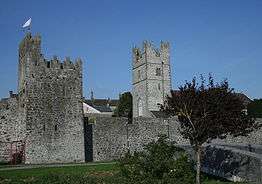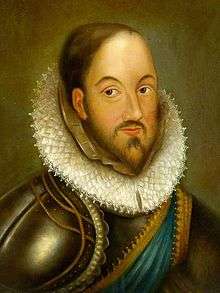John Everard (MP)
Sir John Everard (c.1550–1624) was an Irish barrister, politician and judge. He was notable as being the last Irish judge until the reign of James II to openly profess the Roman Catholic faith. His religious beliefs eventually led to his enforced resignation from the Bench. He then entered politics, but his political career descended into farce when, having failed to become Speaker of the Irish House of Commons in 1613, he refused to vacate the Speaker's chair until the successful candidate, Sir John Davies, (who was a very fat man) literally sat on him. He was in temporary disgrace as a result, but was later restored to royal favour. His second son, Sir Richard Everard, was the first of the Everard baronets of Ballyboy.[1]
Background
He was a native of Fethard, County Tipperary, eldest son of Redmond Everard, head of a Roman Catholic family which effectively owned the town of Fethard.[2] He entered the Inner Temple in 1578 and was called to the Bar in 1590. In 1602 he was appointed a justice of the Court of King's Bench (Ireland) and knighted. He went regularly on assize in Meath, Louth and Kilkenny.[3]
Judicial career
While some Irish judges secretly remained loyal to the Roman Catholic faith, Everard was apparently unique in his generation in openly adhering to it, as did his brother James, who became a Jesuit.[4] This gave grave offence to the Crown, especially at a time when the Lord Deputy of Ireland was Sir Arthur Chichester, a firm Protestant who vigorously enforced the Penal Laws, even going to the lengths of executing Catholic bishops.[5] Everard however was held in high regard by most of those who knew him – even Chichester liked him personally – and for a time he was allowed to retain office; but in the long run his position was untenable and he resigned, presumably under official pressure, in 1607. He was given a pension, and the office of chief judge, or senseschal of the Palatine Court of Tipperary,[6] although that office was largely a sinecure which was described contemptuously as "the judicial scrapheap".[7] He remained a member of the King's Inns, and was made a Bencher in 1609.[8]

In addition to the town of Fethard, of which he was effectively the owner, he held substantial lands in Tipperary and in County Waterford. Though he was accused by his opponents of engaging in dubious land dealings[9] he was also noted for his acts of charity, and obtained a royal charter to found two almshouses in Fethard in 1611.[10]
Politics
In 1613 the only Irish Parliament of the reign of James I was called, and Everard was returned as member of the House of Commons for Tipperary (his father had represented the same constituency in the Parliament of 1585-6).[11] He was the choice of the Catholic members, who were still, if not a majority, at least a very large minority,[12] as Speaker; but Lord Deputy Chichester was determined that his right-hand man Sir John Davies, the Attorney General for Ireland, should be Speaker. The Catholic members declared that Everard had been elected and he took the Speaker's chair. Matters then descended into farce when the Government declared that Davies had been elected Speaker: Everard, normally a man of good sense, foolishly refused to leave the chair until Davies, a very fat man, sat on him. Everard and his supporters then withdrew in protest.[13]
As a result of his conduct he was summoned to England and imprisoned in the Tower of London, and was expelled from the King's Inns.[14] He was soon freed, and on his return to Ireland he urged the Catholic community to show moderation. Despite the debacle of his failed election as Speaker, he played an active role in the Parliament of 1613–5.
He was readmitted to the King's Inns, at the request, perhaps surprisingly, of Lord Deputy Chichester. Despite their differences in matters of religion, the two men had become friends and business partners, and Chichester wrote to the Council of the King's Inns, praising Everard's good conduct in Parliament, and suggesting that a man who was so worthy in everything except religion should be readmitted.[15] The Council, apparently without much enthusiasm, complied.[16]

Later years
After Chichester was recalled as Lord Deputy in 1616, Everard felt confident enough to write to the English Crown, urging the relaxation of the laws against recusancy, and for the admission of Catholics to the legal profession.[17] His hopes of reform were quickly dashed, as Chichester's successor Oliver St John, 1st Viscount Grandison continued the policy of persecuting recusants. Nonetheless Everard was still well regarded by the Crown, receiving several privileges in the form of the right to hold fairs and markets. In his last years he enjoyed the friendship of the powerful Anglo-Irish magnate Richard Boyle, 1st Earl of Cork, with whom he engaged in several business transactions, and whom he entertained at his home shortly before his death in 1624.[18]
Family
He married Catherine Comerford[19], probably a relative of his judicial colleague Gerald Comerford, and had at least three sons, including:
- Nicholas, a barrister;
- Richard, who in his father's lifetime was created a Baronet, of Ballyboy, County Tipperary. He became a prominent member of Confederate Ireland, and was executed by the victorious Cromwellian forces in 1650;[20]
- Gilbert
and also:
- an unnamed daughter, who married Henry White.
References
- Ball, F. Elrington The Judges in Ireland 1221–1921 John Murray London 1926 Vol. 1 pp.227–8
- Ball p.227
- Ball p.227
- John O'Hart Irish Pedigrees, or the Origin and Stem of the Irish Nation 5th Edition Duffy and Co. Dublin 1892
- Ball p.227
- The Earl of Ormond had palatine jurisdiction over the county of Tipperary, with power to appoint judges and sheriffs; the court was abolished by the County Palatine of Tipperary Act 1715.
- Although in the 1680s the workload was apparently heavy enough to require two judges: Ball p.360.
- Kenny, Colum The King's Inns and the Kingdom of Ireland Irish Academic Press Dublin 1992 p.201
- Kenny p.81
- Ball p.227
- Ball p.228
- Wedgwood, C.V. Thomas Wentworth, 1st Earl of Strafford 1593-1641- a revaluation Phoenix Press reissue 2000 p.149 gives a figure of 132 Protestant MPs to 100 Catholics.
- "Sir John Davies" Encyclopædia Britannica 1911 Vol. 7 pp.864–5
- Ball p.228
- Kenny p.93
- Kenny p.93
- Crawford, Jon G. A Star Chamber Court in Ireland- the Court of Castle Chamber 1571–1641 Four Courts Press Dublin 2005 p.322
- Ball p.228
- O'Hart Irish Pedigrees
- O'Hart, John The Irish and Anglo-Irish Gentry Dublin 1884 Vol. 1 p.67